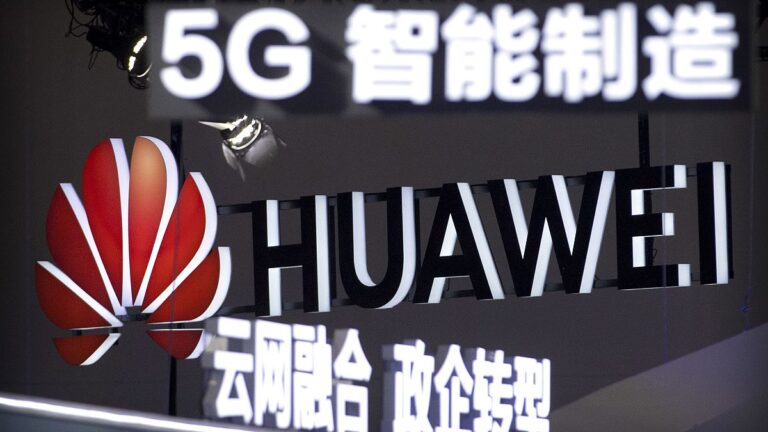In case of non-compliance, follow-up action by the Commission is expected.
A European Commission spokesman told Euronews that just 11 of the EU’s 27 member states have used their legal powers to impose restrictions on telecoms suppliers deemed high risk, such as Huawei and ZTE, over 5G network infrastructure.
According to the European Commission, one new country has been added to the list since February last year, and several more are currently in the process of being added.
This comes after the European Commission adopted a so-called 5G cybersecurity toolbox in 2020 to protect 5G networks from cyber threats and risks.
In response to security concerns, EU member states have agreed to apply restrictions, including necessary exemptions, to suppliers considered high risk, such as China’s Huawei and ZTE.
In addition to bans, most EU member states have introduced rules to restrict providers – 21 have adopted rules and three are considering draft legislation – that would allow national authorities to restrict or block providers they deem posing a high risk to 5G networks if they deem it necessary.
But efforts by national governments have not gone far enough, and EU officials say further measures are expected if compliance is not observed.
investment
Huawei and its rival ZTE faced global distrust in 2018 after governments in Japan, the United States and the European Union barred them from public tenders and telecommunications network deployments, citing allegations of espionage and concerns about ties to the Chinese government.
Sweden was one of the first countries to ban the use of Huawei equipment by its network operators. The government also ordered Huawei to remove any equipment already installed by January 1, 2025. Huawei appealed the case, but a Swedish court upheld the decision of the Swedish Post and Telecommunications Authority (PTS).
Huawei has always denied the allegations, claiming it is an independent company. “The Chinese government does not interfere in our operations or the security of our products, and we firmly reject any attempts by any country or organization to coerce us,” the company has repeatedly said.
Despite the European Commission’s concerns, several EU countries are still working on partnerships with Huawei, such as the situation in Italy, where Prime Minister Giorgia Meloni recently returned from an official visit to China, and Germany, where the issue was recently the subject of a cabinet decision.
Italy: Case by case
Italy has not banned Chinese manufacturers outright, but instead considers them on a case-by-case basis — for example, telecommunications operator Fastweb was blocked from signing a contract with a Chinese company for its 5G network in 2020.
In addition, Italian Prime Minister Giorgi Meloni visited China last month and signed agreements to cooperate with China in areas such as food safety and energy.
This includes an agreement to foster a strategic partnership on electric vehicles, which has become a symbol of growing trade tensions between China and the EU, which in early July imposed provisional tariffs of up to 37.6% on Chinese-made electric vehicles, with the support of Italy.
German ban for network protection
Last month (July 11), the German Federal Ministry of the Interior issued a statement saying that, following an agreement with telecommunications operators Deutsche Telekom, Vodafone and Telefonica, Huawei and ZTE components must be excluded from the 5G core network by the end of 2026 at the latest.
Interior Minister Nancy Faser said the decision came after a “careful consideration” of the risks posed by key components from Chinese manufacturers in Germany’s 5G mobile network. “We are protecting Germany’s central nervous system for communications – for companies, for citizens, for businesses and for the country,” she added.
In its national security strategy, Germany has decided to better protect critical infrastructure such as its public 5G mobile network and reduce reliance on individual suppliers.
“Telecommunications networks in particular must be protected against hybrid and cyber attacks that could soon pose an existential threat. It is therefore crucial to rely on trusted manufacturers to avoid significant vulnerabilities and dependencies,” the ministry said.
Slovenian opposition rejects bill
Slovenia is one of the few countries that has not banned Huawei outright: in 2022, the opposition rejected a government bill (the Electronic Communications Act) that would have allowed the country to remove high-risk manufacturers from the market, arguing that the legislation was aimed at Huawei.
The Slovenian government said its main goal was to revise national laws to bring them in line with EU rules, with the aim of improving network security.
But two years earlier, in 2020, Slovenia had signed the 5G Security Declaration with the United States, agreeing to “promote a robust 5G ecosystem and rigorous evaluation of suppliers and supply chains.” This came after the country had signed the London Declaration with NATO allies in 2019, recognizing the need to rely on secure and resilient systems and committing to ensuring the security of communications, including 5G.


